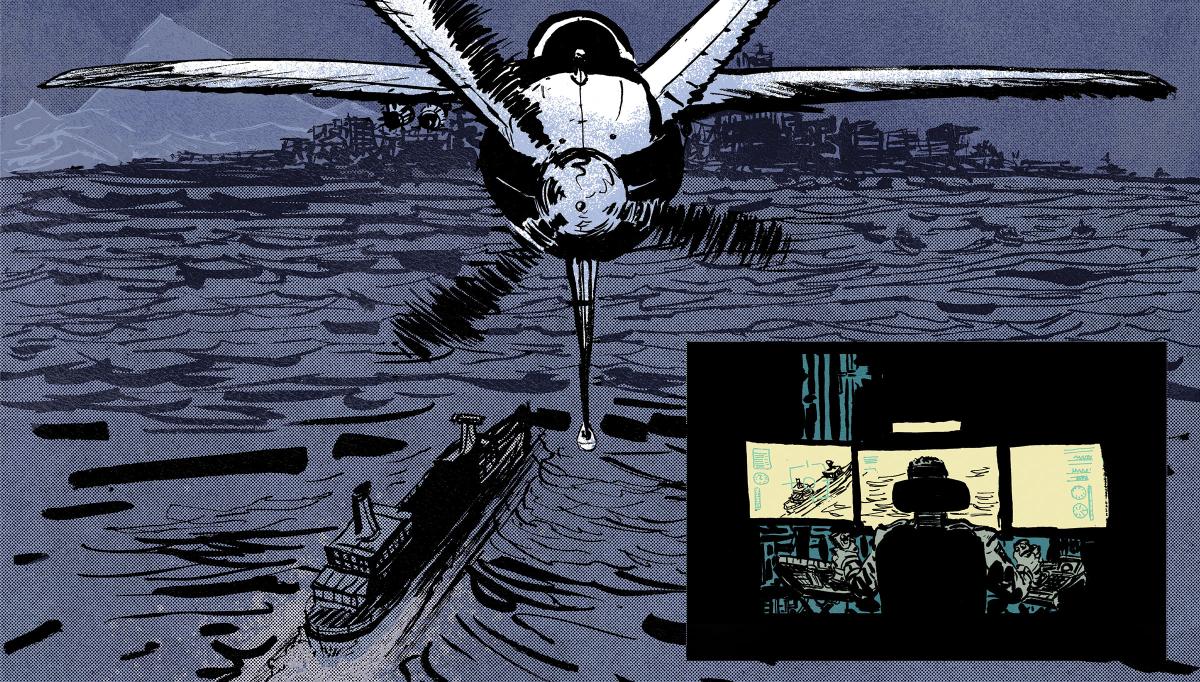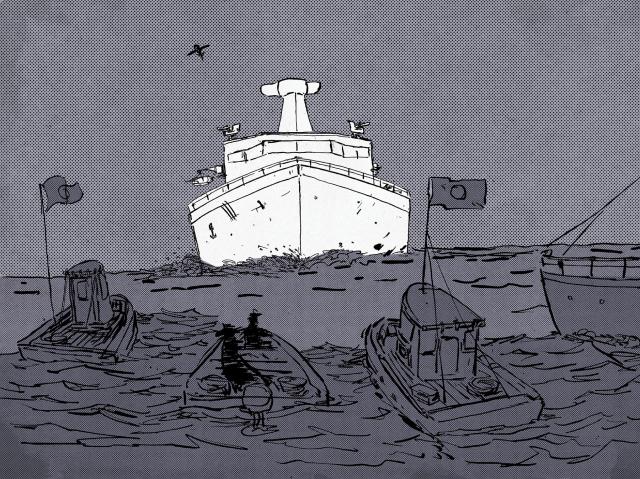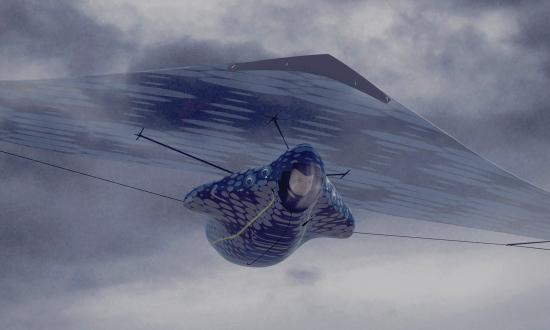Captain Hal “Sleazy” Slotsma watched the sea pass underneath his aircraft. The day was calm and the water’s surface mostly unmarred, though the occasional wakes passing through his field of vision led him to fishing vessels and other small craft. Looking at the brilliant blue water illuminated by a sun just starting to set, he could feel a familiar emotion building inside.
“I am so damn bored,” he announced, startling the other person in the cockpit.
“We still have four hours until the break crew gets in,” said Corporal Sam “Curbs” London, settling back into her seat and glancing at the shift schedule on a screen to her right. “Is it your Friday or something?”
“Thursday,” said Sleazy glumly. He had two days left in his rotating workweek.
“Well, you’re in for a long night,” said Curbs, catching the edge of a wake and following it with the aircraft’s camera. “You never know, though. Maybe this wake leads to a sub and we get the XO’s bottle of scotch.”
“Some sub to leave a wake this big,” said Sleazy, as the camera finally caught the other edge of the wake, the disruptions making a “V” pointing to a ship still off-screen. “Maybe a tanker got lost.”
“Maybe not,” said Curbs, who had caught up with the ship and begun to zoom in.
Instead of the high-walled stern of a tanker, the ship’s aft was flat and sleek. As the camera slewed, it became clear that the ship was military, not commercial; it had a well-marked helipad, tapered bridge, and two uncovered mounted machine guns.
“Well, they’re not supposed to be here,” said Sleazy. “White hull?”
“White hull,” confirmed Curbs, identifying the ship as Coast Guard instead of a gray-hulled regular Navy vessel. The white hull also provided enough contrast to clearly see the bright red Chinese flag flying from the mast. “Not a monster ship, though.”
Curbs was right. The ship didn’t have the familiar bulk of the CCG-3901, a massive China Coast Guard ship that had terrorized Japanese fishing boats for the past four months. The outdated ship had surprisingly free rein of the area after decisively winning a game of chicken against a Japan Coast Guard cutter. A determined rescue effort saved the Japanese ship from sinking, but political leaders had still backed away from any further confrontations.
This mystery vessel’s course was as unusual as its type. Curbs was used to seeing Chinese ships patrolling a regular path through the waters off the Senkaku islands, part of normalizing their “domestic police actions.” This ship, however, was steaming in the general direction of the disputed islands, but it wasn’t on the normal course.
“I’m going to see where they’re headed,” said Sleazy, pulling up a moving map on a screen to his left. “Let’s look around to see if there’s anyone else.”
“Copy,” Curbs acknowledged, beginning an expanding search with practiced precision as Sleazy projected the ship’s course on his map. As far as he could tell, it would pass within two miles of Uotsuri Island, the westernmost of the disputed Senkaku islands. It wouldn’t be the closest approach he had ever seen—hell, a maritime militia fleet had briefly landed on the islands a couple months ago—but it was odd. Odd enough for him to take a closer look.
“Coming left,” he said to Curbs, banking gently and activating the aircraft’s air-to-sea radar to sweep the area off the islands. There was plenty to find—just under two miles northwest of Uotsuri there was a cluster of a dozen returns, perhaps more. Sleazy waited for the radar to make a second pass, but the screen froze. Looking to another screen, Sleazy could see that the feed from the camera had frozen there as well.
“Lost link,” said Curbs, somewhat obviously. The link between their ground control station and the MQ-9 remotely piloted aircraft had failed. Sleazy and Curbs were now sitting in a moderately expensive shipping container in Hawaii, not in the cockpit of an aircraft flying over the East China Sea. Sleazy picked up the phone.
“Savage 26 lost link,” he told the communications technician on the other end. “Let’s get countermeasures going.”
It wasn’t long after the Marines started flying MQ-9s in the Pacific that the Chinese had begun interfering with their command-and-control links. The interference had turned into a back-and-forth competition, with increasingly ingenious and complex jamming and counter-jamming. The latest solution let MQ-9 aircrew defend their link to the aircraft . . . usually.
“Sorry, sir, but we can’t,” the tech answered immediately. Sleazy was sure he could hear other phones ringing in the background of the call—not a good sign. When comm techs were busy, it was often a bad day for everyone. “There’s jamming across the whole scope. I’m surprised the damn phones are working.”
“It’s not just us?” asked Sleazy, surprised. Harassing one MQ-9, especially one near the Senkakus, was pretty par for the course. But the Chinese normally avoided escalation.
“It’s everyone,” confirmed the tech. “Not just SatCom, either. Over-the-air comms are out, and the internet is so slow that even the backup chat is down.”
“How are we talking, then?” asked Sleazy. While he was talking on what seemed like a phone, it was technically a Voice over IP device routing the call through a secure network.
The tech laughed.
“Security by obsolescence,” he said. “There’s a backup mode on these things that routes through an old satellite constellation in the X band that no one uses. It’s so out of date that the Chinese probably decommissioned their jammers for it.”
Sleazy laughed too. “Hey, no mocking old tech. This whole MQ-9 program basically exists because the Air Force had leftovers. In fact, we used to be on X-band.”
“Too bad you’re not there anymore,” said the tech. “Anyway, sir, you need anything else? It’s getting pretty hectic here.”
Sleazy stayed silent, staring at the frozen image on the screen. “Hang on a second,” he said. “Curbs, do you remember the brief we got with the last software update?”
Curbs looked up from documenting the jamming. “Yes?” she answered hesitantly.
“Not a test,” said Sleazy, grinning. “Do you remember the new procedure for emergency divert? One of the steps was to manually disable the link recovery automatic checklist.”
“Yeah,” said Curbs, “because the genius engineers still had it set to the backup.”
“The X-band backup!” Sleazy turned back to the phone. “Still there?”
“Yeah, and I heard you,” said the tech, starting to get excited. “We’re not really supposed to use that constellation without coordinating first, but what the hell. How do you feel about limited bandwidth?”
“A hell of a lot better than no bandwidth,” said Sleazy. “Give me the numbers.”
They went back and forth for a couple minutes, getting the technical details for the new link pathway. Finally, the video stuttered. It dropped noticeably in quality and then restarted, displaying blue water dulled by low fidelity. Triumphantly, Sleazy and Curbs retook control of the aircraft and camera.
“Nice thinking,” said the comms tech. “You might be the only people with a connection back home.”
“We’ll see what we can do with it. Thanks for getting us going again,” said Sleazy. As he hung up the phone, Curbs was already looking for their target. The China Coast Guard ship, moving at an unhurried 10 knots, was easy to reacquire.
“Tally,” announced Curbs. “Same course, same speed.”
“Headed right toward those other contacts. Let’s see if we can find his friends.”
“You think maritime militia?” asked Curbs as she worked.
“Probably,” said Sleazy. “They love to cause trouble.”
The camera, zoomed out to move quickly, picked up some specks. The images enlarged, then sharpened as Curbs worked her controls.
“We should have put money on it,” she said. The ships were civilian, but they weren’t the fishing ships of the maritime militia. They were massive and had just begun a slow crawl toward the Senkakus. A brief check on the Coast Guard ships showed they had changed course to join as a small flotilla a mile or so off Uotsuri.
“RO/ROs,” said Sleazy, referring to roll-on/roll-off ships used to transport cars. “That’s new.”
“And they’re moving,” pointed out Curbs. “Right toward the islands.”
Sleazy considered briefly, then pointed the aircraft at the Senkakus. RO/ROs might be an easy way for patriotic Chinese citizens to transport some supplies to Uotsuri as a publicity stunt. Or they might be a great way to transport military equipment. Sleazy figured that in the worst-case scenario, it couldn’t hurt to be in a position to intercept.
“Let’s try to figure out what we’ve got,” he said. He pulled up yet another screen and scrolled to the location of the Chinese fleet, finding a cluster of returns from the hodgepodge of sensors on the aircraft. It looked largely like any other civilian group of ships with their associated emissions. Radios, navigation radar, AIS signals—the mess of identifiers required to operate safely in international waters. Most were represented as dots, but two-way communications were represented by faint lines. They branched out to navigation stations, other vessels, and . . . an area near the city of Fuzhou?
“Hey, Curbs,” said Sleazy, pointing at the lines. “You see this HF connection? Every ship has one to Fuzhou.”
Curbs sat up straight. “Isn’t the Eastern Army headquarters in Fuzhou?”
She was right—the PLA command responsible for the invasion of Taiwan and the Senkakus was communicating with this fleet. If Sleazy had any doubts about what was in the RO/ROs before, he didn’t now.
“It’s an occupation,” he said. “They’re going to land enough equipment to make it a fait accompli. Probably a whole A2AD kit.”
“What can we do about it?” asked Curbs. “Even if we could confirm it, and even if someone wanted us to shoot, we can’t talk to anyone with this jamming. Look, the damn phone even cut out.”
She pointed at the phone next to her, which now featured a prominent spinning wheel.
“We’re not going to start World War III anyway,” said Sleazy. “We need a nonkinetic option.”
“Get some 35s in here for a show of force,” suggested Curbs. “That would scare them right off.”
“Probably, but it’ll take too long,” said Sleazy. “They’re not going to pack up after they land, it would look too bad. We have to get them to turn around.”
“So, we need to spook them with all of one MQ-9,” said Curbs. “Hey, we could try a show of force.”
Sleazy laughed. The Reaper was many things, but it wasn’t intimidating. A low pass over the ships wasn’t going to scare off the China Coast Guard. If the MQ-9 was going to scare the Chinese, it wasn’t going to be with its speed.
“I think I have an idea,” he said, “but it’s going to mean a major security violation.”
“Good thing the security team is on leave.”
“Alright, grow a track,” said Sleazy, “and grab my cell phone from the front. We’re going to become some open-source intel.”
In a surprisingly short time, everything was set up. Sleazy’s cell phone was propped up haphazardly on a stand, livestreaming to Twitch. The viewership was surprisingly high—a counter in the corner read 482—and surprisingly localized to Japan. Marine liaisons, informed by a cell phone call, had reached out to the Japan Coast Guard, which had in turn distributed the stream to local fishing boats. An overlay even included a helpful map showing the location of the video feed.
Smaller and nimbler than the Chinese RO/ROs, Japanese fishing ships started moving toward the Senkakus. Even the poorest fishers carried a small Starlink terminal, and word spread at the speed of low-earth orbit internet. After the Chinese rammed their Coast Guard ship, Japanese citizens were determined to prevent another embarrassing maritime incident. It was hard to feel anything other than admiration as a cluster of small boats gathered around the islands. And the group of boats kept growing.
Sleazy also felt increasing concern for the fishers. The China Coast Guard ships were paramilitary vessels. They were larger than any of the fishing ships, and they were armed. If they wanted to clear a path through the impromptu fishing blockade, they could do it. But if they did, it would be a bloody, aggressive act. Maybe too aggressive—maybe so aggressive that it would set the Chinese back more in international opinion than the gains from occupying the Senkakus.
“They have to know we’re here,” said Sleazy.
“Show of force?” asked Curbs hopefully.
“Sort of,” said Sleazy. One of the few radio channels not filled by the static of jammers was 156.8 MHz, a channel reserved for vessels in distress. Feeling a strange sense of relief when the static stopped and he heard radio silence for the first time in hours, Sleazy switched to the distress frequency and keyed the mic.
“Unknown Chinese vessels at position 25 48 north, 123 20 east, this is the United States military,” he said, keeping his voice level through the adrenaline of unauthorized international diplomacy. “You are unlawfully transiting a designated protected area within sovereign Japanese waters. Reverse course, acknowledge this transmission, and exit Japanese waters immediately.”
“I don’t think that’s the script from the SPINS,” said Curbs wryly, referencing the theater Special Instructions that spelled out authorized radio transmissions in exacting detail. The instructions were so precise that there was a persistent rumor of pilots who had lost their theater qualification for getting a single word wrong. And Sleazy had just gone completely off-script.
“Not quite,” agreed Sleazy, letting out a breath. “Don’t worry, I’m pretty sure you won’t have to do the requalification training with me.”
Any further contemplation was cut off by a return radio call, delivered in English so pristine and mellifluous that it might have been from a professional actor.
“American aircraft,” said the voice. “This is the Chinese Coast Guard patrol cutter Haijing 1126. You and the paramilitary fleet of boats off the Diaoyu Islands are in Chinese territory and are in an area of live-fire operations. Please exit the area to the east, or there may be unintentional damage to your vessels or aircraft.”
Time to call their bluff, thought Sleazy, hoping desperately that it was true.
“Haijing 1126,” he responded, ensuring that he kept using his cool radio voice, “this is an MQ-9 aircraft with a full-motion, high-definition, video feed of your actions. Any attempted ‘accident’ will be broadcast live to the world and recorded for history. If you do not believe me, I invite you to tune in to the broadcast yourself.”
He slowly read out the website for the live stream, to no immediate response from the Chinese. But a couple minutes later, the viewer count began climbing rapidly. Most of the new viewers were smart enough to route through a VPN, but apparently some of his new Chinese audience was in too much of a rush to bother. Satisfied that his message had gotten across, he returned to the radio.
“Haijing 1126, this is the United States military. I assume you have now seen our live feed. Any hostile act against this aircraft or Japanese ships in the area will be a public act of violence and aggression.”
He bit back the instinct to add “and get the hell out.” The Chinese ships needed a way to leave without losing face, and they couldn’t do that if it looked like they were following American imperialist direction. He bounced his leg nervously as he waited for a response, shaking the cockpit until Curbs looked over, annoyed. He stopped and focused on flying a precise figure eight in the sky over the Senkakus while they waited.
“American aircraft,” said the Chinese voice, abruptly. “Your presence is illegal, as is the presence of unauthorized fishing ships. We have noted the hull numbers of all ships involved and will be issuing citations for unauthorized fishing operations. We will also file a complaint and issue a fine for the unsafe operation of an aircraft inside an Air Defense Identification Zone. Haijing 1126 out.”
“They’re changing course,” said Curbs, amazed. “I can’t believe that worked.”
Sure enough, Sleazy could see the small fleet breaking up. The RO/ROs turned ponderously back onto a course toward the mainland, as the Coast Guard ships split off to pick up a standard patrol route. Over the next few minutes, the video quality snapped back to high-definition normality as the jamming between cockpit and aircraft disappeared. At the same time, the persistent static on the tactical frequencies cleared, and aircraft began checking back in. The East China Sea was returning to its normal uneasiness.
“Well,” said Sleazy. “I’m not paying that fine.”







